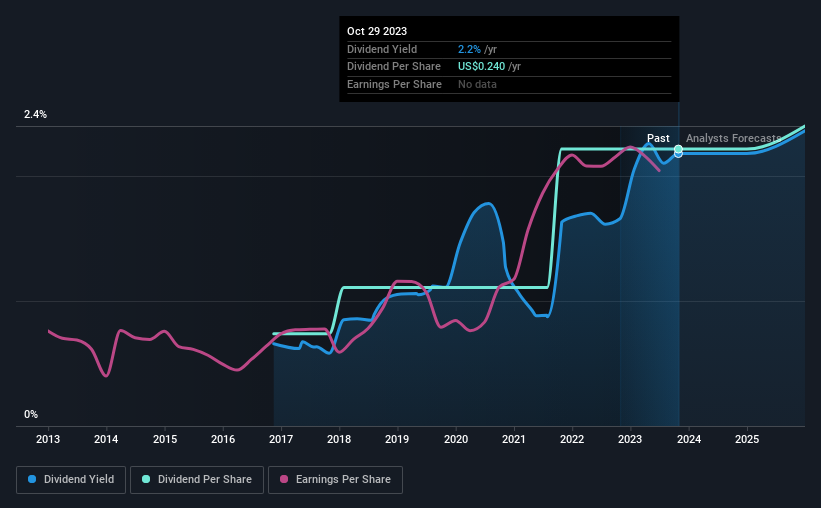First Bank (NASDAQ:FRBA) Has Announced A Dividend Of $0.06
The board of First Bank (NASDAQ:FRBA) has announced that it will pay a dividend on the 24th of November, with investors receiving $0.06 per share. Including this payment, the dividend yield on the stock will be 2.2%, which is a modest boost for shareholders' returns.
View our latest analysis for First Bank
First Bank's Payment Expected To Have Solid Earnings Coverage
The dividend yield is a little bit low, but sustainability of the payments is also an important part of evaluating an income stock.
First Bank has established itself as a dividend paying company, given its 7-year history of distributing earnings to shareholders. Using data from its latest earnings report, First Bank's payout ratio sits at 14%, an extremely comfortable number that shows that it can pay its dividend.
Looking forward, earnings per share is forecast to fall by 3.1% over the next 3 years. However, as estimated by analysts, the future payout ratio could be 15% over the same time period, which we think the company can easily maintain.
First Bank Doesn't Have A Long Payment History
The dividend's track record has been pretty solid, but with only 7 years of history we want to see a few more years of history before making any solid conclusions. Since 2016, the annual payment back then was $0.08, compared to the most recent full-year payment of $0.24. This works out to be a compound annual growth rate (CAGR) of approximately 17% a year over that time. The dividend has been growing rapidly, however with such a short payment history we can't know for sure if payment can continue to grow over the long term, so caution may be warranted.
The Dividend Looks Likely To Grow
The company's investors will be pleased to have been receiving dividend income for some time. It's encouraging to see that First Bank has been growing its earnings per share at 15% a year over the past five years. A low payout ratio and decent growth suggests that the company is reinvesting well, and it also has plenty of room to increase the dividend over time.
An additional note is that the company has been raising capital by issuing stock equal to 28% of shares outstanding in the last 12 months. Trying to grow the dividend when issuing new shares reminds us of the ancient Greek tale of Sisyphus - perpetually pushing a boulder uphill. Companies that consistently issue new shares are often suboptimal from a dividend perspective.
First Bank Looks Like A Great Dividend Stock
Overall, we like to see the dividend staying consistent, and we think First Bank might even raise payments in the future. The distributions are easily covered by earnings, and there is plenty of cash being generated as well. However, it is worth noting that the earnings are expected to fall over the next year, which may not change the long term outlook, but could affect the dividend payment in the next 12 months. Taking this all into consideration, this looks like it could be a good dividend opportunity.
Market movements attest to how highly valued a consistent dividend policy is compared to one which is more unpredictable. Meanwhile, despite the importance of dividend payments, they are not the only factors our readers should know when assessing a company. As an example, we've identified 2 warning signs for First Bank that you should be aware of before investing. Is First Bank not quite the opportunity you were looking for? Why not check out our selection of top dividend stocks.
Have feedback on this article? Concerned about the content? Get in touch with us directly. Alternatively, email editorial-team (at) simplywallst.com.
This article by Simply Wall St is general in nature. We provide commentary based on historical data and analyst forecasts only using an unbiased methodology and our articles are not intended to be financial advice. It does not constitute a recommendation to buy or sell any stock, and does not take account of your objectives, or your financial situation. We aim to bring you long-term focused analysis driven by fundamental data. Note that our analysis may not factor in the latest price-sensitive company announcements or qualitative material. Simply Wall St has no position in any stocks mentioned.

